Staff Inquiry: Our Favorite Soundtracks
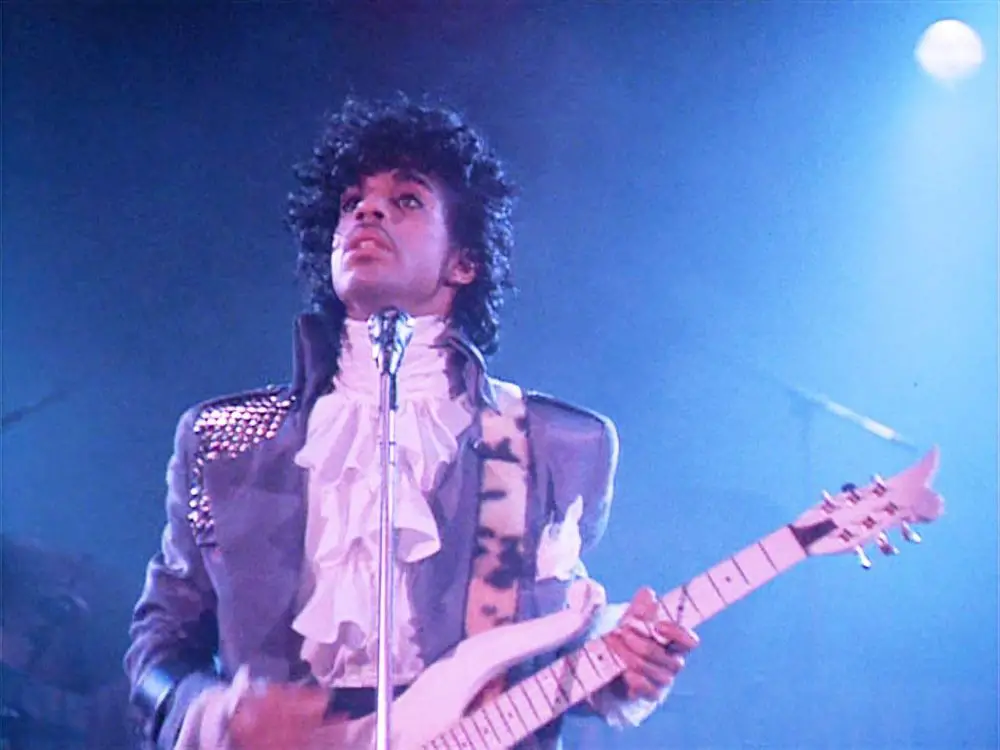
Alex is a film addict, TV aficionado, and book lover.…
We all long for films to leave some kind of mark, to linger with us after the credits roll and make our investment worthwhile. Sometimes that comes from the intelligence or depth of feeling in the movie while other times it’s a killer soundtrack that makes us dance our way out of the theater.
The latter is is what we’re focusing on this month, surveying our writers to see which soundtracks (we’re including preexisting songs and scores) really knocked their socks off. As per usual, you can see everyone’s personal taste shine through, with some preferring retro vibes and others rocking beats. So lets journey down a melodic memory lane, shall we?
Alexia Amoriello – Everybody Wants Some!! (2016)
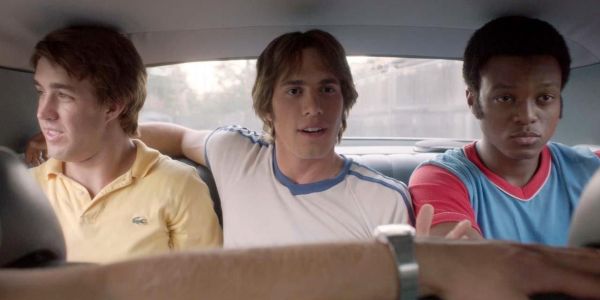
Since this is such a difficult question, I’m thinking of soundtracks in terms of compilations of songs as opposed to scores. There are tons of soundtracks I’m obsessed with, but I’ve never found one where I loved literally every single track. The closest any movie’s come to achieving that is Richard Linklater’s Everybody Wants Some!!.
When I left the theater after seeing it, my immediate reaction was that I needed the soundtrack. But the more I thought about it, I realized nearly every song in the movie was already in my music library. That also includes the songs that didn’t even make it onto the official soundtrack.
I’ll admit that when it comes to soundtracks, my brain gravitates toward Dazed and Confused first, but I prefer ’80s over ’70s music. I also believe it’s important to not be confined to a single genre. With songs like “Rapper’s Delight” by The Sugarhill Gang and “Alternative Ulster” by Stiff Little Fingers, Everybody Wants Some!! boasts an eclectic range of genres. It features everything from The Knack’s “My Sharona” to The S.O.S. Band’s “Take Your Time.” It’s got rock, disco, punk, hip hop, and more.
The songs also work really well within the context of the film. Most of the music is diegetic, but Linklater finds a way to make all these different genres relevant to the narrative. Linklater’s also a stickler for accuracy when it comes to song choices. In an interview with The Toronto Star, he explained, “If I know a song came out a year later than the time when the film is set… you just lost me. You can’t approach a period film saying, ’Oh, who’s going to care?’… I’m doing it for that one person who does care. Because they’re out there.”
Zoe Crombie – The Boat That Rocked (2009)
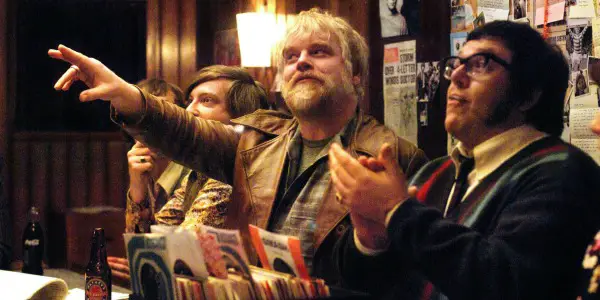
Perhaps more so than any other, this is a staff collaboration article that will be highly influenced by subjectivity and personal taste. Case in point, my choice: the ok-ish film The Boat That Rocked (or Pirate Radio if you’re watching this very British film in the States). This is a movie plagued with questionable jokes, odd pacing, and a cartoonish villain. But it remains one of my most rewatched films of all time almost entirely for its ’60s rock and roll soundtrack that elevates the source material with its iconic tunes.
The tepid romance between the shy Carl and his more daring love interest Elenore is heightened wonderfully through the use of The Turtles “Elenore”, which lends a charming innocence to what is otherwise a somewhat uninteresting subplot. Chris O’Dowd’s Simon miserably lip-synching to Lorraine Ellison’s “Stay with Me Baby” creates a spot-on blend of tragedy and comedy, while Hendrix’s “The Wind Cries Mary” is moving backing for one of the more sombre moments in the film. Even the credits are perfectly scored, with Bowie’s “Let’s Dance” serving as a joyfully defiant end to a surprisingly conventional film about rebellion.
The best musical moments in this film, however, are the montages that play along with some of the tunes the fictional DJs put out to the world. Out of them, my favourite has to be the visuals that are set to The Kink’s “Sunny Afternoon”, from schoolgirls dancing in unison to a young couple sharing a tender moment outside their van.
The best soundtracks not only fit within, but actively improve the films they are paired with, and I can’t think of a better example of the power of a solid soundtrack than The Boat That Rocked.
Bree Duwyn – Almost Famous (2000)
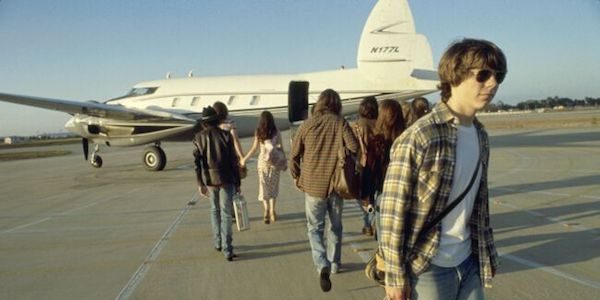
Almost Famous is inexplicably one of the most musically powerful films to kick-start this millennium. Following a plucky young journalist, William Miller, and his journey with a band and their biggest fans, Almost Famous is the creation of an imaginative cloud of pure fun and enjoyment through the voice of music.
Traveling with rock and roll through 1973 was the peak time to experience living in the moment and following your heart. An era of discovering a home on the road and riding the waves of guitar riffs. The raw, unfiltered relationships of the band members of Stillwater (based off of director Cameron Crowe’s real experience with various bands), mirror their passion for music.
Note that not all is settled between bandmates Jeff Bebe and Russell Hammond, their butting heads cause aggressive disputes throughout Almost Famous. However, one of the most memorable scenes features an aggravated band after Russell returns from a night of drug-induced partying.
The band sits in quiet contemplation but as soon as “Tiny Dancer” by Elton John rings out throughout the bus, every soul, including the beloved Band-Aid Penny Lane, begin singing. Instantly, a shift is felt, and it is a transcendently raw moment as if the sun is coming out from behind storm clouds.
As Penny whispers to William about how he’s finally home, it’s easy to find the truth behind it. In the end, this soundtrack not only brings back the legends of rock but reminds you why you fell in love with music in the first place.
Frazer – Lost in Translation (2003)
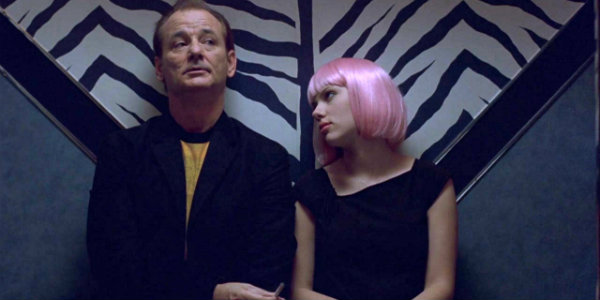
Lost in Translation is nothing if not a layered film, but not all of its legacy is positive. Although Sofia Coppola intended for the film to be about alienation and trying to apply meaning to your life in the modern world, the film is fraught with a host of supporting Japanese characters that can only be described as racist caricatures. Because of that, the film has become a symbol for everything wrong with the Western film industry’s perception of the Far East. There are people far more qualified than me to comment on the matter who have done so (Kiku Day’s article in The Guardian is a good one on the topic).
Maybe that’s the reason the aspect of the film remembered most fondly is its soundtrack, which is littered with songs that seem to have been written specifically for the film, though they weren’t. Perhaps the best is My Bloody Valentine’s “Sometimes”, but the majority of the soundtrack is split into two halves; one of them is faintly nostalgic and forlorn, (the aforementioned “Sometimes” and Roxy Music’s “More Than This”), and others are faintly optimistic.
There are definitely standouts throughout the film’s soundtrack, and a fair few songs which, out of the context of the film, are almost unlistenable, but the ones that do stand out as being great make the film more emotionally resonant, and in turn, their relationship to the film makes them more emotionally resonant too. Coppola hasn’t made a film as interesting and layered as Lost in Translation since, and though the film itself is problematic, the best songs from its soundtrack are classics at this point.
Soham Gadre – Dil Se… (1998)
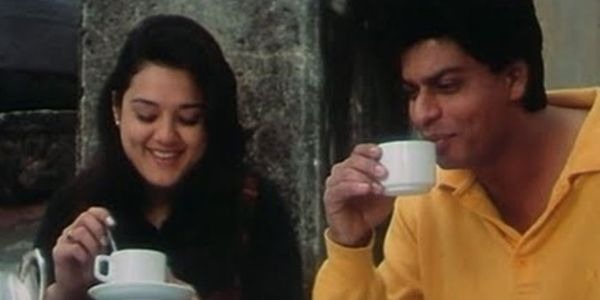
The opening credits to Spike Lee’s Inside Man and the music choice Spike uses will never sit right with me. The reason is because the song that plays in the opening credits, “Chaiyaan Chaiyaan” from Mani Ratnam’s 1998 Bollywood thriller Dil Se… (the elliptical is part of the film’s title), is a complete package of thumping instrumentation by composer A.R. Rahman that works seamlessly in sync with the visual pleasure of watching Shah Rukh Khan dance on top of a train rolling through a dense, humid jungle mountainside.
Ratnam and Rahman have been working in tandem as director and composer for nearly three decades and in two separate industries (Hindi cinema and Tamil cinema). Like Gulzar’s Aandhi, the songs in Dil Se… are meticulously composed along with what goes on screen. They don’t even necessarily further the story but go beyond the Bollywood penchant for escapism by utilizing the idea of a music video quite literally and inserting it within breaks in the narrative. Soundtracks in Indian cinema traditionally are meant to be much more than accompaniments; they are literal vehicles to transport you away from the narrative, or through it.
As the music gets quieter in “Chaiyaan Chaiyaan” and Sukhwinder Singh’s raspy melodious vocals dim, the train enters a pitch black tunnel with only Khan and Malaika Arora being slightly illuminated by an orange light that seems to come from nowhere. It’s as if the scene, and the music, enter a different dimension. You feel it, too. Like the greatest of soundtracks, when you listen to it within the movie or on your headphones, you will never feel like you’re in the same place after it ends.
Zac Hestand – Purple Rain (1984)
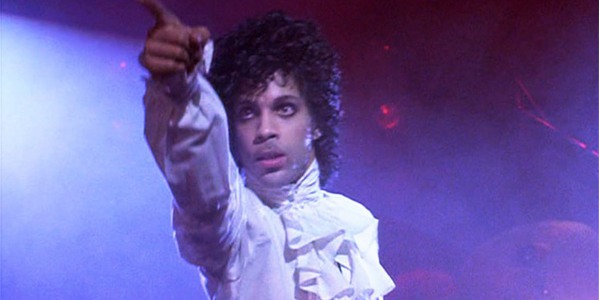
With my first music-related piece, I wanted to be sure to pick a quality soundtrack. There are several films that have become immortalized by their music even to the point where the soundtrack eclipses the movie itself (a certain Seal song is better than the entirety of Batman Forever). With that said, a soundtrack that I adore, even more so than the movie itself, is Purple Rain.
Purple Rain the movie is a simple paint-by-number love story and tale of a struggling singer who dreams of stardom, but my goodness, what a killer soundtrack! The songs elevate the film even more with the vocals, music, and charisma of Prince and his band, The Revolution. The songs sync up with our hero’s journey.
With “Let’s Go Crazy”, Prince opens with a short narrative, inviting the audience to join him on his quest for greatness. Prince’s character wants to hit the big time, but can’t seem to hit the mark just yet. The song, “Baby I’m a Star”, contains the lyric “I don’t want to stop until I reach the top” and he wants to reach that point with the girl he has his eye on. With “Take Me with U”, it contains the line “all I want is to spend the night in your arms”, building up the romance aspect. The soundtrack follows the story beat-by-beat, ultimately taking us to the movie’s climax.
The movie ends with the songs “Purple Rain” and “I Would Die 4 U”. In terms of context, an unfortunate family situation leads to his performance of “Purple Rain”, elevating the emotional stakes. The song makes me misty-eyed and results with his character achieving the fame he sought. The film ends with “I Would Die 4 U” as his message of proclaiming love to his dream girl.
With the passing of Prince, the song “Purple Rain” packs even more of an emotional gut punch, as do the other songs on this soundtrack. To paraphrase a former instructor of mine, “We don’t make motion pictures, we make emotion pictures.” This soundtrack lives up to this quote; each song hits you hard but leaves you wanting more.
Katy Kostakis – Mortal Kombat (1995)
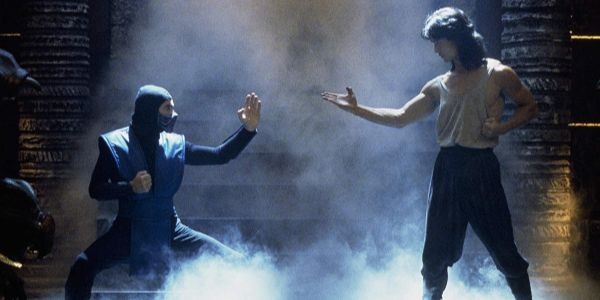
An action-packed, fight-heavy game such as Mortal Kombat deserves not one but multiple banging soundtracks for its movies, and they definitely deliver! If you are a Gen X’er, chances are that you’re a fan of the high-energy martial arts video game and were well aware of the several soundtracks that came out even before the film was released back in 1995.
For Mortal Kombat’s film soundtrack, not only does the most famous cut of the video game’s soundtrack made it onto the list, The Immortals’ “Techno Syndrome”, but the now-defunct TVT Records struck gold by selecting a smorgasbord of genres to compile the rest of the collection, and it’s loaded with amazing acts in industrial, metal, and electronica. Thanks to it, I was introduced to one of my absolute favorite bands, KMFDM, as well as Fear Factory, Type O Negative, Gravity Kills, and Orbital.
Because of its huge success, a compilation album, More Kombat, was released one year later. Made up of tracks in the same vein, it featured more acts I ended up loving: Sepultura, Killing Joke, Cubanate, and The Crystal Method. Even though the sequel did nowhere near as well as its predecessor, the soundtrack to 1997’s Mortal Kombat: Annihilation kept the momentum going with songs by Juno Reactor, Scooter, Rammstein, and once again, another powerhouse track by KMFDM.
Though it’s been over twenty years since the movies and albums have been released, they still hold up extremely well today. I still associate each moment of both films with the respective track played for each scene’s duration. Trust me, you cannot go wrong by popping these soundtracks into the radio of your car or living room and jacking up the volume and bass as high as you can take it. Flawless victory.
Maria Lattila – Drive (2011)
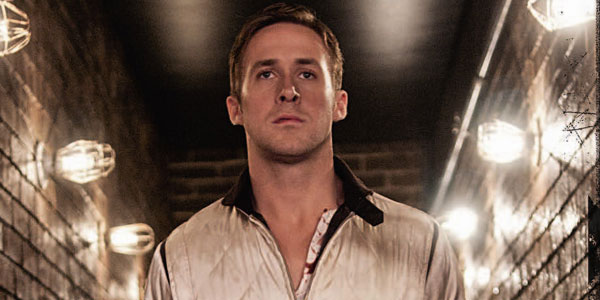
Soundtracks are tricky. Consisting of both the score and licensed songs for the film, they can be at best transformative or at worst manipulative earworms. It’s not enough to have the latest single or a hot collaboration (looking at you Taylor Swift and Zayn Malik) to fuse the soundtrack and the film together. The perfect soundtrack, for me personally, is one that will instantly transport me back into the movie, as if I was watching it all over again.
Here’s where Nicolas Winding Refn’s Drive comes in. Now a cult classic, Drive is one of the rare films that has an incredibly powerful score by Clint Mansell and a great array of songs. Anyone who has seen it can’t listen to “Real Hero” by College and Electric Youth without seeing Ryan Gosling lying motionless in his car, only to get up and drive off into the sunset.
Mansell’s score is hauntingly beautiful and strong in its electronic beats and strings but never invasive. It’s unusual, as is the film, with tracks like “Skull Crushing” being surprisingly tender and quiet for, you know, crushing skulls. Mansell gives you what you need, but never what you expect.
“Under Your Spell” by Desire immediately brings to mind Carey Mulligan’s face in the golden hour in the front seat of a car. Kavinsky & Lovefoxxx’s “Nightcall” makes me want to get in a car and drive to downtown L.A. with only the streetlights illuminating my voyage. I live in London and I can’t drive, but the urge is there because all I can think about are those scenes in Drive, proving how powerful the soundtrack is. It only exists in relation to the film, having merged together seamlessly in my mind.
And that’s why Drive has the best soundtrack. Ever.
Alex Lei – A Brighter Summer Day (1991)
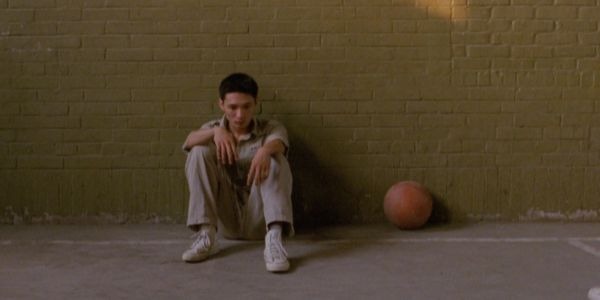
While American films go back to doo-wop and the early days of rock ‘n’ roll for nostalgia, Edward Yang uses the songs of his childhood to color a troubled early ’60s Taiwan. Here, the soundtrack of American pop music is just another part of a youth culture in search of identity, caught between the traditional Chinese that fled to the island after the communist victory of 1949 and the western influences of the new country’s military backers.
Meeting up in ice cream parlors or school auditoriums, the street gang kids form cover bands of that day’s hits. What could have been little moments of retreat from their troubled times, these scenes are always underscored by the film’s seriousness—a performance of Frankie Avalon’s gushy love song “Why” ends with a backroom leadership dispute, and gang conflict almost makes one character miss singing Rosie & the Originals’ “Angel Baby.”
Then, of course, there is Elvis’ “Are You Lonesome Tonight?” out of which the English title takes its name because one character mistakes the lyrics “A bright and sunny day” for “A brighter summer day.” It’s a song that Elvis himself found too sad to sing, and it becomes the goal of one of the characters to record it in his own voice. Using what is usually viewed as the music of a simpler time, Yang brings out the sadness and uncertainty of his childhood.
Andy Punter – Into the Wild (2007)
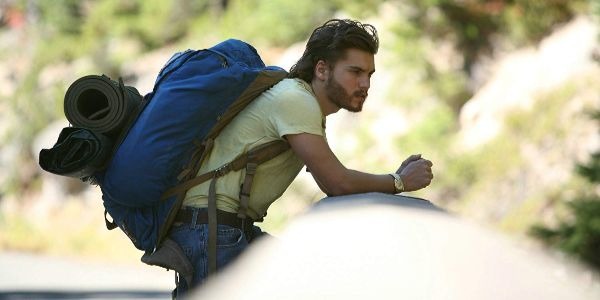
The best movie soundtracks tend to elevate the music, imbuing the song with new meaning and forever giving the listener a new way to relate to the music they hear. The first few bars of a particular song heard on the radio transport us to where we first heard that song, and sometimes that place just happens to be at the movies.
For me, the best example of this is 2007’s Into the Wild. Eddie Vedder’s original soundtrack to Sean Penn’s meditation on self-reliance is as integral to the finished product as the cinematography or the acting performances on display.
The soundtrack album on its own plays as (predictably) an Eddie Vedder solo venture. It fits together as a single album with a clear through-line from beginning to end and everything sort of makes sense. If you like Vedder or Pearl Jam, then it is certainly worth a listen on its own terms even without the connection to the film.
It’s when it is paired with the sweeping visuals of the film, the wide expansive shots showing us endless wilderness and the very edge of the world that the lyrics and composition start to take on a new meaning. It becomes something else, something much richer.
Into the Wild is a film about searching for meaning beyond materialism, shedding all the trappings of mainstream society in favour of something more stripped back, more raw. Vedder, Penn, and Jon Krakauer (who wrote the book the film is based on) seem perfectly in step in how they see the world and came together to create one single unified piece of work. As Vedder puts in his song “Guaranteed”, “On bended knee is no way to be free”.
Lewis Punton – Dumb and Dumber (1994)
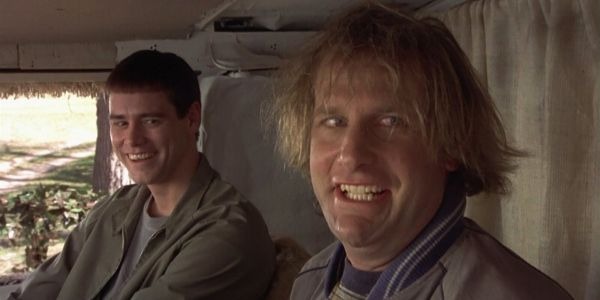
Let’s talk road trips, an idea that would be completely void of purpose if it wasn’t for the rise of killer soundtracks, soundtracks that boost morale, signify location, and still manage to act as sonic gasoline for the vehicles of our heroes far and wide.
In Harry and Lloyd’s case, the Mutt Cutts mobile relies on a selection of plucky alternative jams to ground the madness of the pair’s antics, throwing a somber tone into the mix of iconic comedy, a melancholy overcast that reminds us that the story is one of friendship and brotherhood.
From The Sons to The Crash Test Dummies, Dumb and Dumber’s playlist features tracks that serve as a reminder of the outrageous duo’s personalities, linking the sensibilities of the pair to the poppy moments of alternative funk, not to mention the hints of jazz that can’t help but dictate the pace of the venture.
By throwing bold moments of instrumentation into the trunk of a vehicle so destined for wild comedy, Dumb and Dumber showcased a perfect soundtrack for a film so outrageous, highlighting the positivity of the almighty road trip with jams bound to occupy your headspace for days on end, but who needs the radio, right Lloyd?
Linsey Satterthwaite – Eternal Sunshine of the Spotless Mind (2004)
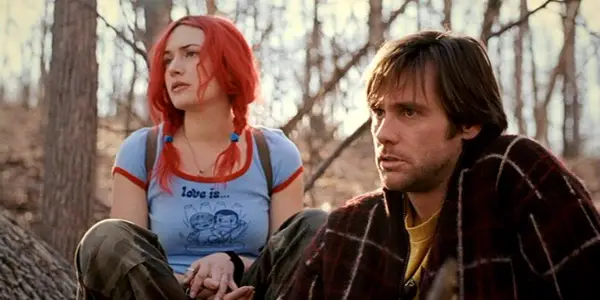
For anyone that knows me, they will know that I have such affection for Eternal Sunshine of the Spotless Mind that I could wax lyrical about any part of this film, whether it’s the acting, direction, or how it is the ultimate depiction of love. So, whilst I may be somewhat biased, the soundtrack for Eternal Sunshine is worthy of the praise as it echoes and enhances the film’s essence.
Combining original music from composer Jon Brion and a smattering of artist tracks, it is a jumble of upbeat moments and melancholy flickers. There are chaotic tracks which represent the confusion within the timeline and within Joel’s head. But then, as he begins to remember the beauty of his relationship, Brion musically begins to tug at the heartstrings of Joel and the audience, reaching a bittersweet crescendo as their final memories together are washed away.
There are pieces of Brion’s score that are so exquisite, seeped in aching and sweeping melodies that you wish were longer, like Joel trying to hold on to the memories of Clementine. As a listener, you try to savour those gorgeous moments of music, but they are swiftly gone. And then there is Beck’s version of “Everybody’s Got to Learn Sometime”, which becomes a tender lovelorn anthem for a generation of fated romances and perfectly represents the two central characters. And once you have heard it, you will always connect it to Eternal Sunshine, to that fateful fade out on a beach in Montauk which no amount of Mierzwiak procedure could erase.
Matthew Roe – Stoker (2013)
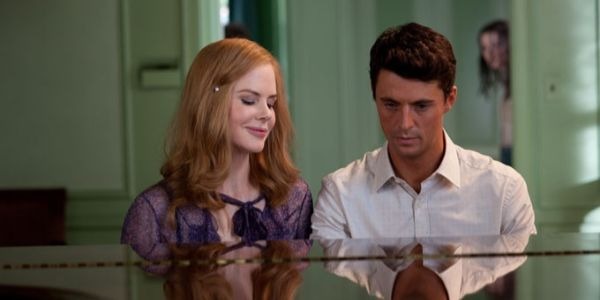
Clint Mansell has been one of the more exploratory film composers for the past two decades, beginning with Darren Aronofsky’s Pi and Requiem for a Dream and continuing through to the present day with his scores for Loving Vincent and Doom Patrol. While his collaborations with Aronofsky are some of the best examples of musical scoring locked-in-step with its filmic source, one work that often goes overlooked is his contributions to Chan-wook Park’s 2013 feature Stoker.
The film is sublimely produced, thoroughly well-written, unnervingly acted, and directed with the tact of a silent avalanche – a deft and challenging piece of cinema. However, the effects of the film’s narrative and creative decisions pack the punch that they do due to Mansell’s subdued and eerily ruminant score. He combines lilting chimes, echoing music boxes and whistling, creeping and pulsing tones, scattered piano solos, and swelling strings and horns to make a cacophony of unusually complementary sounds. What results is an atmosphere which always keeps you on edge, even if you believe to understand what is coming, and perpetuates a subtle fear of the worst yet to come, even as the ending credits roll.
The score also features some work of legendary composer Philip Glass (who was the original composer for the film), “Summer Wine” by Nancy Sinatra and Lee Hazlewood, a duet by the composers Sugar Vendil and Trevor Gureckis, and the absolutely iconic track “Becomes the Color” from multi-instrumentalist Emily Wells (who also produced the final song “If I Ever Had a Heart”). If listening to the score outside of the film, besides a couple tracks, you wouldn’t believe it to be music for a slow-boiling psycho-sexual thriller, and that’s part of Mansell’s genius.
Definitely one of the more downplayed contributions to film music, but one that never ceases to send chills down my spine no matter how many times I have listened through it.
Jim Ross – Trainspotting (1996)
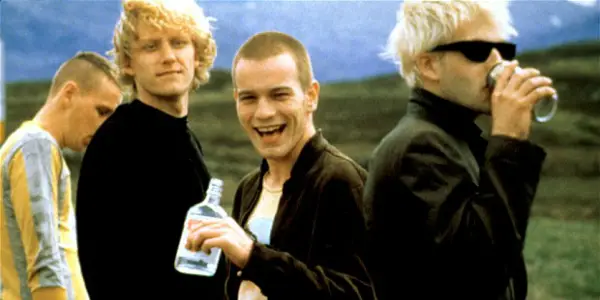
Many soundtracks are lauded for their great choice of music – known hits and the more obscure – and many scores are heralded for the tonal control driven by their orchestral magnificence. The power of the Trainspotting soundtrack is blending both good popular music and the mood-setting aptness of a classical score.
The soundtrack does this from the opening scene: the iconic sprint of Renton and Spud down Princes St. in Edinburgh evading the police. John Hodge’s “Choose Life” monologue is recited by Ewan McGregor’s Renton whilst Iggy Pop’s “Lust for Life” pumps out. From the beginning, we see the film’s characters have agency in their descents into heroin-induced stupors. They do indeed have a lust for life, they have chosen life, and this is their choice. Even then, given the song can be interpreted as being about giving up smack, it subverts itself.
In terms of memorable tracks, the film is probably best remembered by “Lust for Life” and “Born Slippy” by NUXX. However, the musical choices are all carefully and meticulously chosen. Blur’s “Sing” underscores the gravity of the death of Allison’s child with both a melancholic piano sound, rising as the glimmer of hope, represented by the suspension of Renton’s prison sentence, comes forth. The lyrics don’t come through during the film, but are eerily apt and recollective if played later.
“Perfect Day” by Lou Reed is famously a drugs-themed anthem, and once again is used in an ironic way to underscore Renton’s journey. Not only is the music excellent, but perfectly pitched for the adaptation of Irvine Welsh’s narrative and amplification of his themes.
Monique Vigneault – The Royal Tenenbaums (2001)
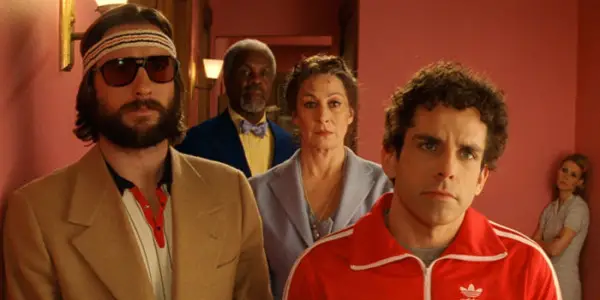
A solid film soundtrack has the power to pull viewers back into a film long after the projector stops rolling. It’s the part of film that we can revisit over and over while performing the most mundane tasks while never failing to fling us back into that cinematic world.
For me, the film’s soundtrack that never fails to do so is the dreamy soundtrack in Wes Anderson’s The Royal Tenenbaums. It is one rife with ’60s and ’70s classic rock hits, and of those many wistful tunes, one always leaps out: Nico’s “These Days”. This mellow score never fails to throw me back into Margot Tenenbaum’s dreamy, off-kilter, 1960’s New York. In slo-mo fashion, of course.
Anderson has been known for his affinity for classic rock in all of his filmography; it’s part of his meticulously crafted brand, yet The Royal Tenenbaums soundtrack stands out because it is consistent with the film’s wistful mood. It stacks one nostalgic tune after another, from The Velvet Underground’s “Stephanie Says” to Elliott Smith’s gloomy “Needle in the Hay” and ending with The Rolling Stones’ “She Smiled Sweetly”.
Say what you will about Anderson’s films, the guy knows how to put together a soundtrack.
Tynan Yanaga – American Graffiti (1973)
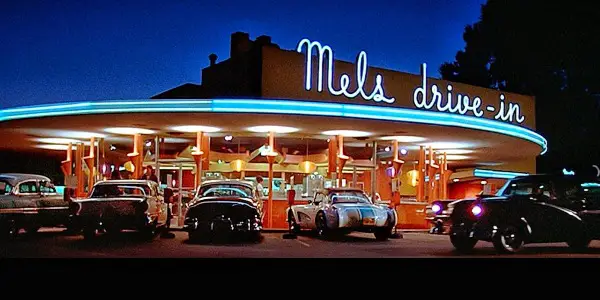
Iconic soundtracks, at their fundamental essence, become almost synonymous with a film. There is no manner in which to tear the music away from the experience on screen. They fit together seamlessly to offer something deeply affecting.
Because the songs we remember and the music that moves us almost become second-nature, they are inbred into the fabric of our beings – words and melodies logged in our minds for posterity. When combined with films they spawn magic. If I’m to draw up the parameters for the greatest soundtracks, I need only dig into my recollections and consider which films pass this test musically.
Star Wars is certainly up for contention as John Williams single-handedly added so much to that world. However, as I’ve gotten older it’s just as easy to consider George Lucas’s debut, American Graffiti. In my mind, along with Martin Scorsese’s Mean Streets, Lucas spearheaded the revolutionary idea of using retro tunes to evoke a certain time and place.
What’s so elemental about American Graffiti is not just the robustness of the wall-to-wall soundtrack – over 40 distinct tunes – but the ubiquitous place they hold in the story itself. Everything we hear in the picture is diegetic meaning it’s literally emanating from the world and giving us this authentic texture no score could provide.
So when we hear The Platters, Del Shannon, Buddy Holly, or The Beach Boys, it throws us in the back seat of each passing car cruising down the main drag. Even if it’s only for a few moments, the melodies pluck us out of our theater seats and place us in the film’s reality, in this case, Modesto, California circa 1962. I’m a nostalgia connoisseur, and for me American Graffiti evokes a bygone era exquisitely, aided first and foremost by its definitive music.
Those are some of our favorite soundtracks. What are yours?
Does content like this matter to you?
Become a Member and support film journalism. Unlock access to all of Film Inquiry`s great articles. Join a community of like-minded readers who are passionate about cinema - get access to our private members Network, give back to independent filmmakers, and more.
Alex is a film addict, TV aficionado, and book lover. He's perfecting his cat dad energy.













